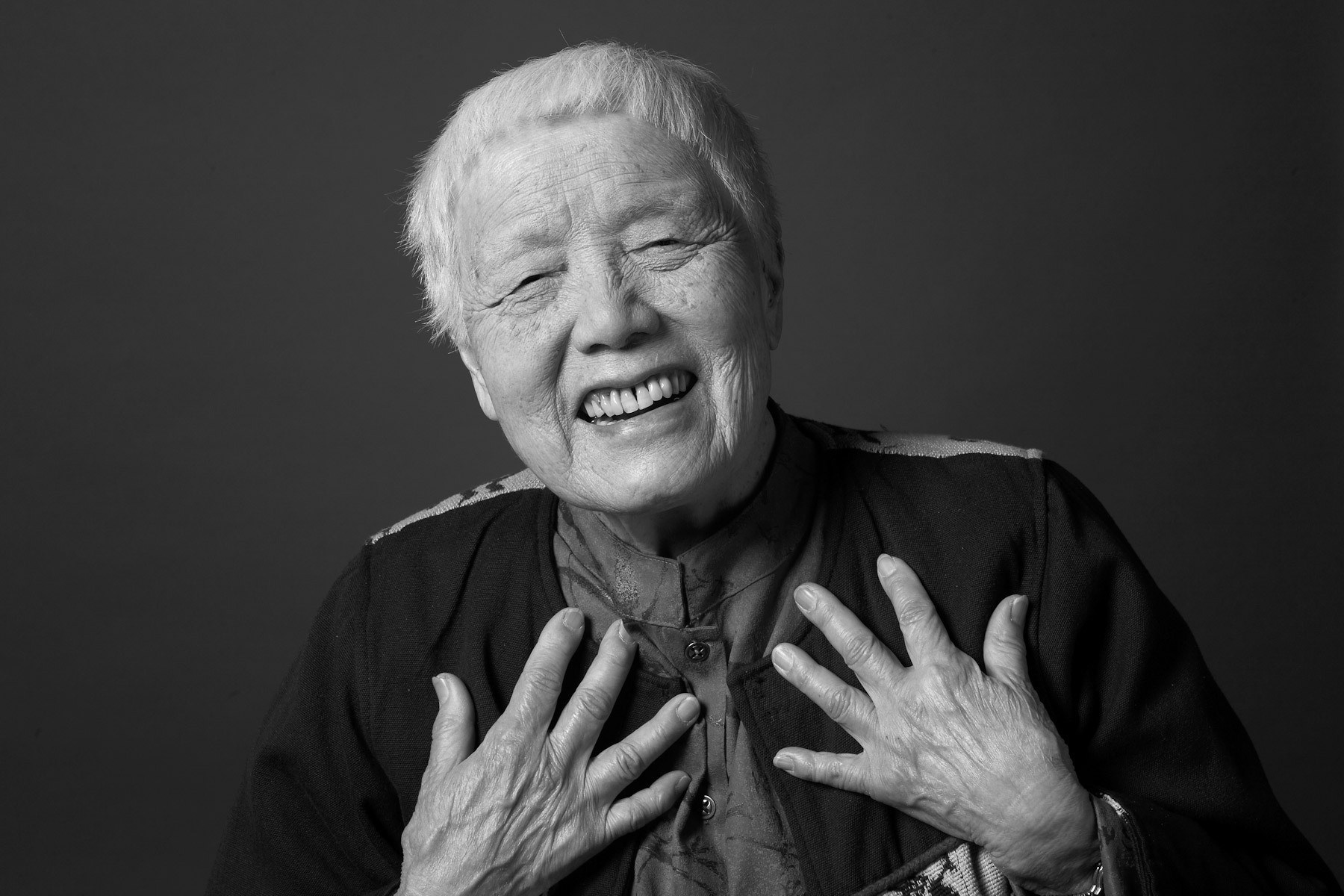Responding to Trump: Lessons from Grace Lee Boggs
image by Robin Holland
by Scott Kurashige
What time is it on the clock of the world? This is the question Grace Lee Boggs regularly posed at the start of political gatherings. Many have asked me what Grace would say if she were alive in 2016.
Witnessing and experiencing the right-wing assault on Detroit, Grace had been warning us that this moment was on the horizon. In 2013, she wrote:
With growing unemployment, the crisis in the Mideast, and the decline in this country's global dominance, we have come to the end of the American Dream. The situation reminds me of the 1930s when good Germans, demoralized by their defeat in WWI, unemployment and inflation, followed Hitler into the Holocaust.
These days, in our country, a growing number of white people feel that, as they are becoming the minority and a black man has been elected president, the country is no longer theirs. They are becoming increasingily desperate and dangerous.
Such times require clear and sober thinking. I have no doubt Grace would recite her favorite quote from Marx and Engels in the Communist Manifesto (1848): "All that is solid melts into air, all that is holy is profaned, and man is at last compelled to face with sober senses his real conditions of life, and his relations with his kind."
As Grace says in the film American Revolutionary, “You don't choose the times you live in, but you do choose who you want to be, and you do choose how you want to think.” Marx and Engels responded to a period of tremendous change and uncertainty, when the seemingly unstoppable rise of capitalism upended the traditional norms and ways of life
Now that we have our own monumental and world-changing challenges to face, several lessons from James and Grace Lee Boggs jump to the forefront of my mind today:
First, in this time of chaos, fear, and confusion, the most important thing is to Think Dialectically. Trump’s election is a sign of a system in crisis. Neoliberalism has destabilized the global capitalist order and the revolts of the left and the right, originating in the 1960s, have opened the door to radical alternatives.
As Jimmy and Grace wrote in Revolution and Evolution in the Twentieth Century, we should learn from Hegel that:
Progress or development never takes place in a straight line or just by quantitative increase or decrease. In other words, progressive development is never just evolutionary; it requires great and sudden leaps, drastic changes in direction. But neither does it take place, as Hegel puts it, “like a shot out of a pistol.’”
Second, Grace would tell us to read the eminent historical sociologist, Immanuel Wallerstein on the collapse of liberal capitalism, The Decline of American Power, and The End of the World as We Know It: When a system is running smoothly, it takes a great amount of force to move it slightly to one direction or the other. But when a system is out of equilibrium, small acts can have profound consequences. This heightens the free will factor. Things that seemed wildly impossible (e.g. the first Black president followed by a president endorsed by the KKK) suddenly become realizable. 2050 will be the world we make—we could create a system more democratic and humane than capitalism, but we could also end up with a system that the other side creates that is even worse.
(For more on this, see the conversation between Wallerstein and Boggs in the afterword to the paperback edition of The Next American Revolution.)
Third, this is an age of uncertainty—or as Wall Street calls it, “volatility.” That makes this, as Grace said, a time of both great hope and great danger. We know the danger all too well now. We can’t underestimate this danger. When you’re dealing with far right authoritarianism, you have to guard against dogmatism, sectarianism, and ultra-leftism. The Boggses broke with many radicals when they said we must “Love America enough to change it.”
I want to try to break this down a bit further. When we are organizing a national-democratic majority against creeping fascism, white supremacy, misogyny, and domestic terrorism, we need to reinforce whatever democratic institutions and even symbolism can be found within the American tradition. And we cannot dismiss democracy as a bourgeois creation—we must see democracy as a radical concept and push for grassroots and participatory forms of democracy that actualize democracy’s most radical potential. We should, for instance, study Michael Hardt’s reading of Jeffersonian democracy and the Declaration of Independence. If Third World movement leaders could find a way to put the Declaration into critical service for their revolutions, surely we can find a way to connect it with our own people and movements.
We will be playing a ton of defense for the foreseeable future, but we have to make physical and mental space to transcend the mode of opposition. Our movements emanate from the recognition of love as a collective political force. This is not about making nice with Trump voters (although we better be prepared to articulate what Gramsci called a “national-popular” discourse that peels away at least that segment of Trump voters who viewed him negatively and Obama favorably). It’s about creating both a vision and a working alternative to the cynicism, scapegoating, and divisiveness that gave rise to Trump.
What we are confronting is not just greedy, lying, power-crazed individuals but a reactionary movement that James and Grace Lee Boggs called the counter-revolution. Instead of conventional thinking about right vs. left or race vs. class, the Boggses gave us an original way of understanding the primary contradiction shaping our world as economic overdevelopment versus political underdevelopment.
It is necessary but not nearly enough to get the people (Grace came to reject the concept of the “masses”) to reject the system, and it should now be clear why. Vulgar materialism and commodification have led to the pursuit of quick fixes ranging from the Wall Street casino economy of the neoliberals to the rising wave of right-wing populism, xenophobic scapegoating, and suicidal oil extraction.
So where is there hope? Thinking dialectically means we must “refuse to admit the authority or permanence of an existing state of reality.” We must “be confident that within any particular reality there are internal contradictions which are the basis for negating this reality.” We must “constantly seek to find and hold fast the new positive or the new and higher unity which can emerge out of the resolution of those contradictions.”
The national-democratic mobilization against fascism, white supremacy, misogyny, and domestic terrorism creates a new urgency, new connections, and new possibilities. But we have also shattered the illusion that just changing presidents can solve our problems. We are forced to explore all the ways to change the world while living in fear of state power.
Part of this work of confronting political underdevelopment means getting more people involved in political organizations from the level of the grassroots to the national party. But it also means reorganizing all aspects of life away from atavism and commodification and toward models of collectivity, sustainability, and solidarity. This is how we engage the multitude in the tasks of building self-reliant parallel structures, sowing the seeds of a new social order, and developing the capacities for self-government in the mode of the Zapatistas. It’s what activists in Detroit call visionary organizing in response to the devastation, dispossession, and disenfranchisement and why the lessons of Detroit are critical for the future of us all.
As Grace said in her farewell statement, “A revolution that is based on the people exercising their creativity in the midst of devastation is one of the great historical contributions of humankind.”
Scott Kurashige is a professor at the University of Washington Bothell. He is the author of The Fifty-Year Rebellion: Detroit and the Future of Race and Activism in America and The Shifting Grounds of Race: Black and Japanese Americans in the Making of Multiethnic Los Angeles, and co-author with Grace Lee Boggs of The Next American Revolution: Sustainable Activism for the Twenty-First Century.


